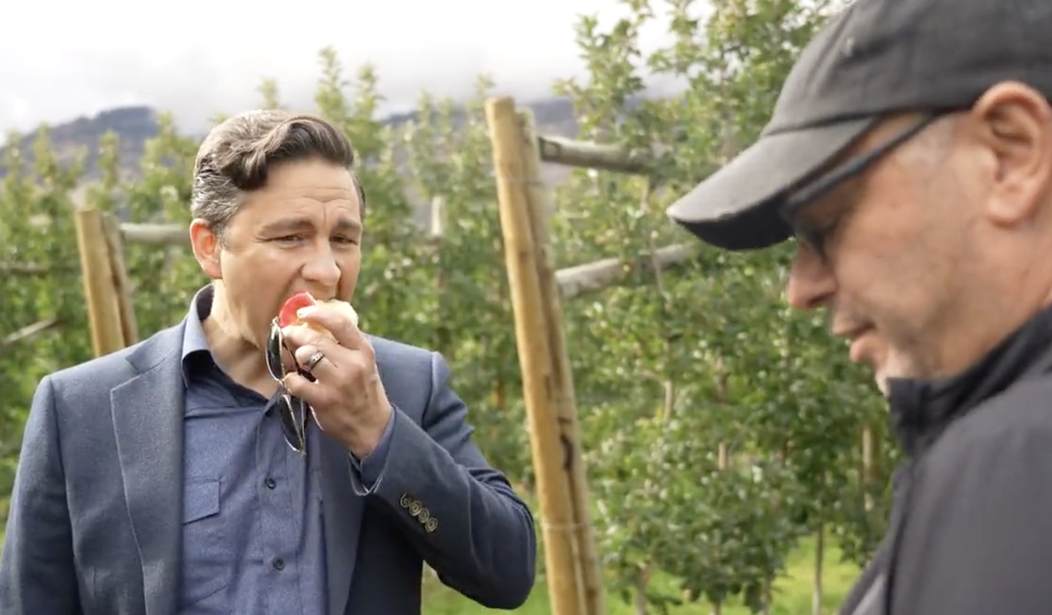He's really good. I told you, he's really good. If you didn't read my piece about Pierre Poilievre last month, I'd encourage you to click the link, check it out, and watch the showcased speech. My introductory summary about the Canadian Conservatives' new leader was that he's "a 44-year-old husband and father, the adopted son of school teachers, fluent in English and French, and married to a Venezuelan immigrant who loathes Communism. It's a compelling story. More importantly, he's been an energetic and dynamic leader who communicates very effectively. He has attracted scores of new voters into his party, including a surprising number of young people." I noted that "Poilievre's Conservatives [are] pushing out to a sizable lead over the Trudeau government," in the upcoming but yet-unscheduled national elections.
Since I wrote those words, that polling advantage has grown. Part of that phenomenon is driven by Canadians growing ever more exhausted and exasperated with the sputtering, virtue-signaling, illiberal governance of Justin Trudeau's leftist rule. Part of it is that Poilievre is just phenomenal at this. I'm not sure I've enjoyed a political video clip this much in quite awhile:
Pierre Poilievre casually smacks down a left wing journalist while munching on an apple. pic.twitter.com/FeAcjCncvw
— Townhall.com (@townhallcom) October 17, 2023
A string of garbage questions and loaded framing from the interviewer, met with casual, deadpan counter-questions from the would-be Prime Minister: What does that mean? What do you mean by that? Give me an example. Like what? I don't really believe in that. Which people would say that? Like who? Effective. Dismantling. The best part by far is when the 'journalist' -- having already been embarrassed for attempting to do so -- again returns to the claim that Poilievre is 'taking a page out of Donald Trump's book.' Response: What are you talking about what page? Can you give me a page? Give me the page. You keep saying that. Flustered, the reporter babbles briefly until the candidate says, I don't know what your question is. The man gives up, finally prompting a non-garbage question. "Why should Canadians trust you with their vote?" Immediately, Poilievre pivots to his core messaging on common sense, inflation, and rising costs.
A thing of beauty. A master class. The apple, for some reason, serves as a perfect accessory in this rhetorical disemboweling, allowing the skeptical but polite candidate to come across as unfazed and unflappable, pushing back lightly as his flailing inquisitor drowns. Munching away, with quick interjections, was subtly dismissive without being overtly rude. He didn't raise his voice. He didn't pound the proverbial table. He didn't accept bogus premises. He simply parried with his own questions, seeking clarity, and crushed the guy. In my previous post, I urged American GOP candidates to observe this man and take some notes. I renew that suggestion. I'll leave you with some other encouraging electoral news from around the Anglosphere, even as the battered British Tories continue to struggle. Down Under, two significant victories -- one against an astoundingly anti-liberty Labour Party in New Zealand, and the other against identity politics in Australia:
The left-wing, fanatically pro-lockdown New Zealand government you reference here was just absolutely destroyed by voters. You tweeted this observation on the actual day of that election.
— Guy Benson (@guypbenson) October 18, 2023
Two major left-wing parties combined for ~37% of the vote. Center-right combined for ~54%: https://t.co/i21F3DL99W pic.twitter.com/YJyl6JOe8g
In a rebuke of a key message of the Yes23 campaign, the electorates with some of the highest Indigenous populations in the country comprehensively rejected the Voice to Parliament.https://t.co/v7rLQSzZBt
— Sky News Australia (@SkyNewsAust) October 14, 2023
The proposed constitutional amendment was categorically rejected on Saturday with all states voting No in the referendum...While individual electorates had no weighting on the result, Sky News Australia’s analysis of the votes showed the five seats with the largest Indigenous population all voted No.
The new leftist government was heavily supportive of the measure, which opponents cast as racially divisive and a counter-productive foray into identity politics. The outcome was a blowout: 'No' won by 22 percentage points, carrying a supermajority and sweeping every Australian state.
























